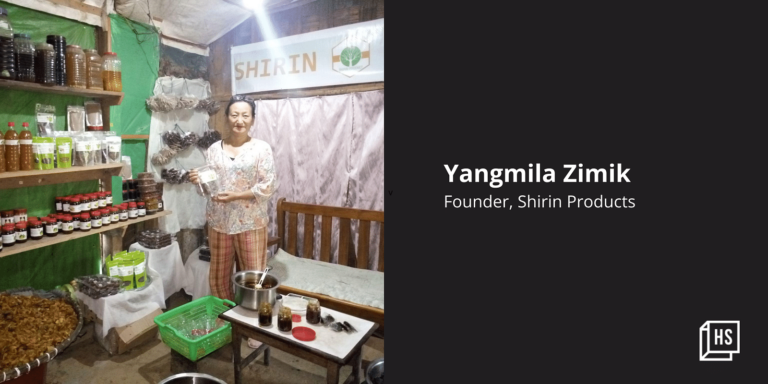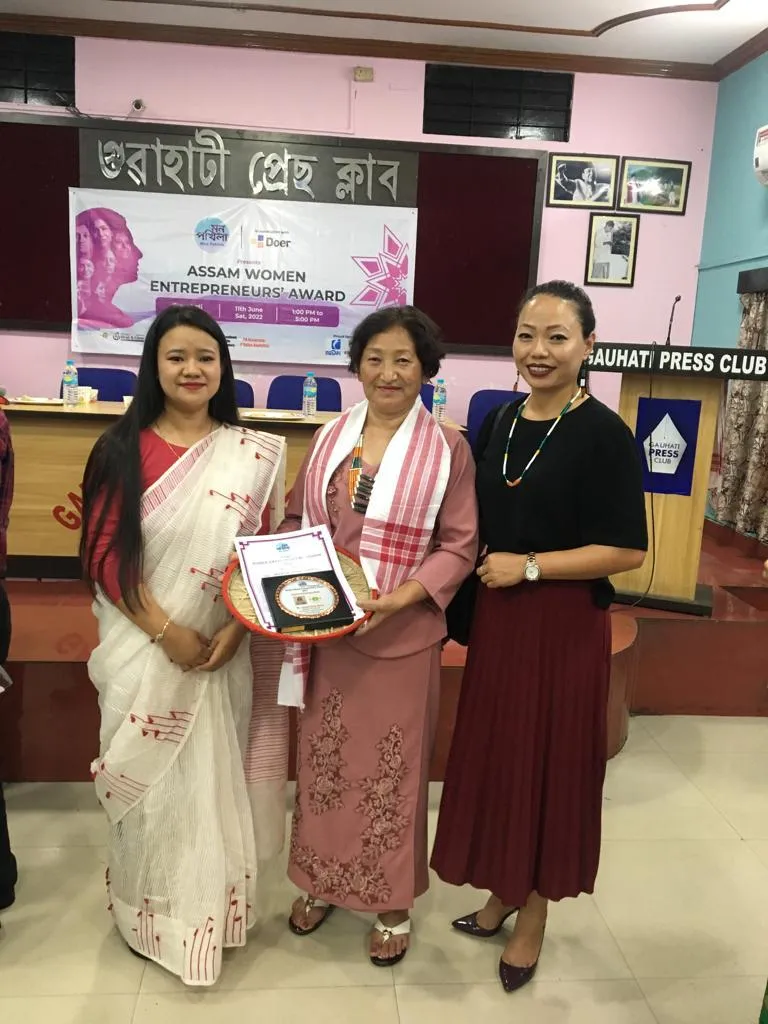
Seven years ago, when Yangmila Zimik attended a training on food processing organised by Ukhrul, Manipur-based NGO, Participatory Action for Sustainable Development Organisation (PASDO), the thing she most looked forward to was making goodies to distribute to friends and family.
Soon after the workshop though, Yangmila, a single mother, felt encouraged enough to start a small-scale venture. She spent Rs 500 to buy gooseberry and sugar, made the candies, and packaged them in small batches.
“I gave the local shops some packages of the candy to see if they can sell them. They sold out fast,” says Yangmila in a chat with HerStory. Conversant only in Meitei, a prominent language of the region, Yangmila took the help of a local translator to sit down for this interview.
Today, as an entrepreneur, employer, and food expert–language is barely a barrier for 47-year-old Yangmila, who is the proud owner of her own food label Shirin Products. The brand is synonymous with several organic products and is found in stores across Manipur.

Yangmila showing Shirin Products at ICAR Imphal to the Minister of forest, horticulture, soil conservation, Government of Manipur, Biswajit Singh.
How the venture began
Yangmila’s candy-making quickly became a huge success, with many kirana shops in the small town of Ukhrul approaching her for more products.
Encouraged by the demand, she decided to invest more time into what was so far a mere hobby–experimenting with food. She started by collecting locally-available fruits like gooseberry, plum, guavas, wild olive, etc., and processed them into candies and jam at her residence in Ukhrul.
In 2017, when she attended another workshop held at the local Krishi Vigyan Kendra (KVK) to learn pickle-making, her interest and enthusiasm caught the attention of the officials at KVK.
They soon assisted her in setting up a small working unit at her home by providing her with a wood oven, gas stove, and jumbo box among others under Socio-Economic Action Plan (SEAP).
From candies and jams to various types of pickles, Yangmila, who started off as a solo entrepreneur, eventually started expanding her repertoire of products. She registered her brand Shirin Products in 2019, which now includes 35 different kinds of food products. In due course of time, she even employed six local women, four of them full-time, and two students who work part-time.
Yangmila says she wants to ensure the students finish their studies because that’s an opportunity she missed out on.
“My mother passed away when I was three years old, and my father remarried. I had six siblings, and it became difficult for us to pursue our education,” says Yangmila, who grew up in the mountain village of Pharung in Manipur before getting married and moving to Ukhrul.

Yangmila and her team working at her home unit.
Everyday scenes
With her only son away pursuing his Master’s in forestry, Yangmila dedicates all her time to promoting her brand. All 35 of Shirin Products’ food items are organic, and include items like pickles, candies, squash, cakes, etc. “You must try the guava green tea, it is supremely healthy and flavoursome,” she says, when asked about some of her unique products.
Yangmila herself distributes these products to nearly 30-50 shops in Ukhrul district, and manages to earn anywhere between Rs 70,000 and Rs 80,000 in a month through physical stores alone. She is yet to explore the ecommerce world, but does sell her products through her brand’s Facebook page.
Her determination and entrepreneurial spirit recently won recognition when she was honoured with the Assam Women Entrepreneurs’ Award for being an impactful entrepreneur in the rural category.

Yangmila receiving the Assam Women Entrepreneurs’ Award for impactful entrepreneurship in rural category.
Not one to sit on laurels, Yangmila says,
“I first hired one person to help me with this venture, but realised that was not enough. Now we are seven of us, and we still do not have a proper work shed or a machine. All our products are made by hand. As for raw materials, there are plenty of fruits here, which we can utilise very well. With the right machines and a fully functional work shed, I could hire more people. The initial days will be challenging but I’m up for any challenges.”
Monetary help and more
Over the years, Shirin Products has become a household name in Ukhrul, but it has also had its share of challenges and obstacles.
Yangmila says the pandemic years were difficult as sales dipped, but she was able to stay afloat because her products are made using local ingredients, and she did not have to depend on the external supply chain to keep production lines open.
As for distributing it to shops, she says customers contacted her directly, and she delivered her products to homes in person.
Yangmila’s entrepreneurial spirit has been recognised far and wide.
While she has been able to fund herself with a grant of Rs 1,20,000 from the German non-profit organisation GIZ, Yangmila has also benefitted from Rang De, a peer-to-peer lending platform championing microcredit access for rural India, through which she has been able to borrow Rs 2 lakh.
This year, Yangmila has applied for the Pradhan Mantri Formalisation of Micro Food Processing Enterprises Scheme (PM FME Scheme). Launched in June 2020 under the ‘Aatmanirbhar Bharat Abhiyan’ and ‘Vocal for Local’ campaigns, the scheme aims to provide technical, financial and business support to micro food processing units in the country.
For Yangmila, bagging the PM FME Scheme grant will be like a true validation of her efforts all these years.